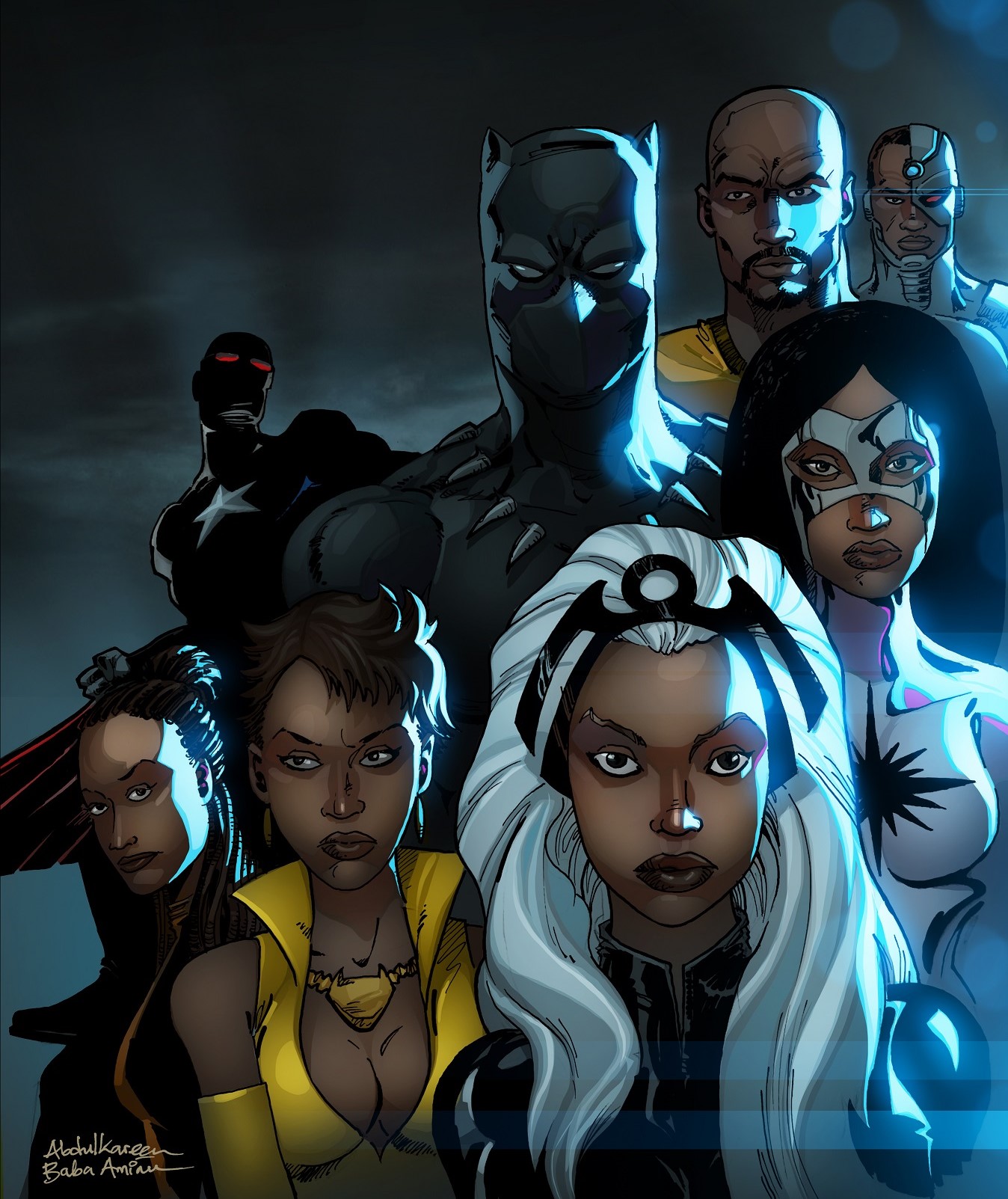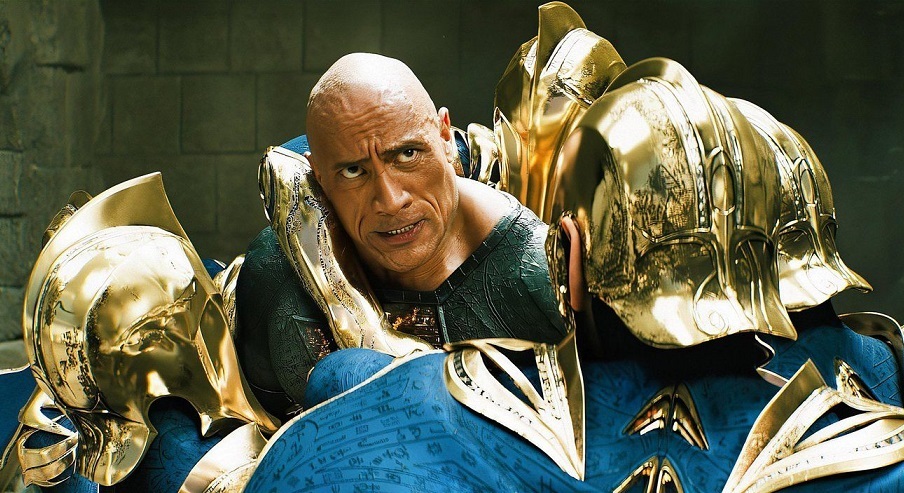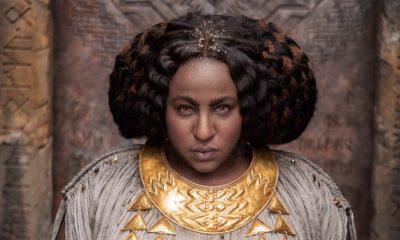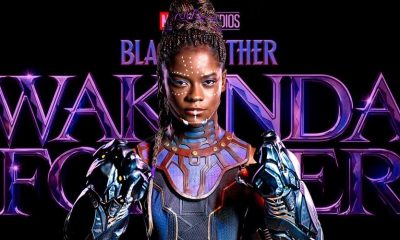VIEWPOINT
Black’s in: When a ‘blackout’ is a good thing
For some of us, this rise of the black superhero – this ‘blackout’ – is personal, and will remain deeply so.
Published
3 years agoon
By
Geek Afrique
Comic books, and related TV shows and movies featuring black superheroes and other characters, are currently enjoying a major boom. From being fringe offerings of years gone or even niche fare of days past, today there’s a veritable ‘blackout’ of sorts in geekdom. Here’s why that’s a good, good thing.
By Abdulkareem Baba Aminu
I’m one of those people who waited for a Black Panther movie, even when it seemed none was on the way. I’m not talking about post-Blade comic book movie days, when Wesley Snipes told me to my face in Abuja, Nigeria, that he was developing one. I’m referring to the early 80s, and the scattered few comics my friends and I would scramble to buy, featuring our favorite characters and their wondrous stories. T’Challa was one whose appearances we greedily devoured, and whose action scenes we would draw out on cheap paper. He also inspired a retinue of our own creations, complete with the tropes and all.
Some of my friends grew up and left comic books behind. I, and a handful of others, did not, and we continued to enjoy our four-color epics, even as they evolved into the cultural movement they are today. But I digress. My childhood friends and I embraced comic books, a great deal of which are American. Marvels, DCs, Archies, and the odd indie title that would find its way to our Kaduna Post Office haunt from where we bought a good chunk of our weekly diet.

We loved Batman, Spider-Man, Daredevil, Thor, Alpha Flight, Green Lantern, Fantastic Four, Teen Titans, The Outsiders, Power Pack, and many, many more. But what really got us going? Black Panther, John Stewart’s GL, Luke Cage/Power Man, Black Lightning of The Outsiders, and finally, Storm of the X-Men (who looked like my big sister Adama then, honest, but sans white hair and blue eyes, natch).
But somehow, back then, we didn’t really care much about how few black characters we had. Maybe it was because Ibrahim Yakubu, then-classmate and brother-from-another-mother and I, would create hundreds (yes, hundreds) of our own characters, detailed back-stories, costumes, and all. We drew, with ballpoint pens on drawing paper and colored in with coloring pencils, our own comic books, and sold them to friends who were starved of comic books.
With the proceeds, we’d run off – unaccompanied and unauthorized – to super-busy Central Market, in rickety and sometimes-dangerous mini-buses, to buy gems like the first issue of Secret Wars by Jim Shooter and Mike Zeck. And also, later on, discover the joys of Swamp Thing, Sandman, Kid Eternity, and other mature readers-themed titles.
“We’d run off – unaccompanied and unauthorized – to super-busy Central Market, in rickety and sometimes-dangerous mini-buses, to buy gems like the first issue of Secret Wars by Jim Shooter and Mike Zeck. And also, later on, discover the joys of Swamp Thing, Sandman, Kid Eternity, and other mature readers-themed titles.”
Many years after, Snipes wowed the world and box office with his awesome martial arts portrayal of Marvel’s half-vampire Blade, and a ho-hum Spawn flick was, well, spawned to yawns from fans. And that was it, really. Fast-forward to today, and of course, we have witnessed the cultural juggernaut which the Black Panther movie is. Boasting an A-list cast, almost all-black, and helmed by a young, black director, that movie is one of the few to ever gross a billion dollars in the domestic U.S market.
It sparked a merchandising wildfire for African clothing and hairstyles, and the soundtrack album, curated by rap superstar Kendrick Lamar, was a massive hit, too. If there ever was a moment that black’s really ‘in’, this was it. A friend described that period weirdly, but aptly, as a ‘blackout’. From having a limited number of black characters in comic books and related TV shows and movies in the past, I’m suddenly spoilt for choice. It is a good feeling – sometimes bittersweet, even – one shared by many creators I had conversations with about the ongoing ‘blackout’.
“From having a limited number of black characters in comic books and related TV shows and movies in the past, I’m suddenly spoilt for choice. It is a good feeling – sometimes bittersweet, even – one shared by many creators I had conversations with about the ongoing ‘blackout’.”
Joe Illidge has a career spanning decades, and has worked on some of the most iconic books in the industry. He told me that growing up, the fact that there were too few black superheroes is something he was always aware of on a basic level, from reading comic books for years and barely seeing any characters that looked like him. “When I started working at Milestone Media, Inc., that’s when the reality of it crashed in on me, because their universe was, in terms of cultural diversity, the antithesis of the superhero universes that served as part of my fiction diet for most of my life,” he said.

On the movies, Illidge told me that while Marvel’s Black Panther movie success will be attributed to too many variables to easily list, a confluence of events led to it. He mentioned the rise of the MCU, the growing buying power of black people in America, the accelerating popularity of Afrofuturism, the resurgence of black film auteurs, as well as the increased dehumanization of black people in America, and the result of them needing to see themselves in a brilliant light which goes against the jackhammer false media narrative of black people as less than. “These factors alone make for a fluid bomb,” he said.
I spoke to Roye Okupe, a creator whose comic books are all based on strong black characters. His biggest hit, Malika: Warrior Queen, is a smash that is getting made into a TV series via a Kickstarter campaign. Originally from Nigeria, he ditched a career in engineering to pursue his dream full-time. He grew up thinking the concept of a ‘superhero’ was something that was meant for only a particular group of people, people unlike himself.

Okupe agrees that there are more black superheroes in comics today, compared to in the past. “Even just looking back at the past 5 years, it’s a huge difference. But I think it has more to do with the indie creators and companies, than any of the major publishers. A lot of people, including me, simply got fed up for waiting for the big guys to do it, so we rolled up our sleeves and went to work,” he said.
“Okupe agrees that there are more black superheroes in comics today, compared to in the past. “Even just looking back at the past 5 years, it’s a huge difference. But I think it has more to do with the indie creators and companies, than any of the major publishers.”
Born and raised in Lagos, Nigeria, he says his goal, for now, is to create characters and stories inspired by things he saw, felt, experienced, and was taught growing up. “I feel a responsibility to provide not only people of African descent, but all races, great stories that also inform about Africa, past, present, and future,” he said.
For writer David Walker, whose fan-favorite work on Marvel’s Luke Cage has attracted awards buzz, said the vast majority of the work he has done in comics has been work-for-hire, starring characters that already existed. “In those cases, such as Luke Cage, Cyborg, or Shaft, those characters were already black. I didn’t create them, so that’s that. But in my own personal work, I frequently have black protagonists, a decision informed by the fact that as a black kid growing up, I rarely saw heroes that reflected my background and experience,” he said.

But, Walker said, while there are more black superheroes in comics today, only a small number get coverage in the press, or enjoy significant sales. “To be clear, even though we’re talking about black superheroes, we aren’t really talking about comic books. We are talking about film and TV. When I wrote Power Man and Iron Fist for Marvel, most people that watched Luke Cage on Netflix didn’t know that Luke Cage was also Power Man. I can’t tell you how many people I’ve met that didn’t know Luke Cage existed before Netflix. Likewise, people seem to think the Black Panther is new, because he’s in a movie, and they think he was created by black creators,” he said.
Walker also said if market realities were truly reflected, then at least 30 to 40 of all comic books would star black characters because blacks make more than a quarter of the market.
“Walker also said if market realities were truly reflected, then at least 30 to 40 of all comic books would star black characters because blacks make more than a quarter of the market.”
John Jennings has the enviable job of being an artist, and an Associate Professor of Art and Visual Studies at Buffalo-State University. He’s also co-editor of Eisner-nominated collection The Blacker the Ink: Constructions of Black Identity in Comics and Sequential Art. Growing up, he tells me, his home state of Mississippi had such naturalized aspects of racism in the very atmosphere, that he didn’t politicize around race until much later.
Jennings says once he realized just how underrepresented black characters and black stories were, he went out of his way to make more. “Creation is a political act, whether you think so or not, and what you choose not to show is just as important as what you do show. Even my organizing of black-themed cons is way to instil the reflections of a spectrum of black images in the psyches of black children and teens. Understanding your own humanity and your own subjectivity is extremely empowering, and something that is inherent in our society for white youth,” he says.

If one looks at the independent black comics creators that aren’t sold in mainstream shops, Jennings says, there are literally thousands of black characters. I ask, are comic books, TV and movies featuring black superheroes ‘cooler’ than before? He replies: “I think that because a few more black creators are working them, they are at least closer to what we may think of as ‘cool’. Cool in the connotation that they are individuals who are free-thinking and are shown as complete beings and not stereotypes. So yeah, they are ‘cooler’.”
However, Jennings says, for this ‘blackout’ to continue, there needs to be support for black creations that aren’t owned by Disney, or Warner Brothers, or whoever. He says: “It’s great to see these huge spectacles on the screen, but there’s a veritable ton of great stories out there created by black independent artists and writers. At the end of the day, a robust independent comics scene will generate even more work that will end up in the mainstream. There has to be a time when a black superhero is the norm, and not a novelty.”
“A proper comic book store anywhere in Nigeria remains an elusive thing. Which I strongly believe is one of the biggest reasons why there’s an explosion of indie publishers putting out stuff varying from political thrillers, and fantasy epics, to superhero soap operas and Hausa legend-based adventures.”
Back at my own reality, though, a proper comic book store anywhere in Nigeria remains an elusive thing. Which I strongly believe is one of the biggest reasons why there’s an explosion of indie publishers putting out stuff varying from political thrillers, and fantasy epics, to superhero soap operas and Hausa legend-based adventures. This is true, also, in Ghana, South Africa, Kenya and more, in essence creating another kind of ‘blackout’ on the continent.
In September of 2006, a friend of mine and I opened the first comic book store in Nigeria. Ah, Planet Comics, we called it. But other careers beckoned and we had to close it down, even though the market was quite encouraging. Today, all grown up, I’m a writer, illustrator, cartoonist, and editor (and I finally understand why J. Jonah Jameson is always so stressed out!). Also, my love for the medium of comics only continues to grow. But now I get my fix from Amazon, sometimes Forbidden Planet UK, Gosh! London, and Kinokuniya outlets in Bangkok, Tokyo, and Dubai whenever I travel. But after all is said and done, for some of us, this rise of the black superhero – this ‘blackout’ – is personal, and will remain deeply so.
A version of this article was published in Full Bleed Vol. 3 (IDW Publishing, 2018)
TV
Review: ‘House of the Dragon’ hits stride in bigger, bleaker season 2
Published
3 days agoon
June 14, 2024By
Geek Afrique
The first season of “House of the Dragon,” HBO’s prequel to “Game of Thrones” and the first spinoff in network history, was widely considered a success. But it was also, in essence, 10 hours of set-up, speeding through decades of context to take audiences to the brink of the Westerosi civil war known as the Dance of the Dragons. Despite its many strengths, the show began as a structural oxymoron: too rushed to do the patient plotting and character-building that gave its parent show such a strong foundation; too slow to sink its teeth into the real meat of its story until the final stretch of episodes, which saw the death of King Viserys (Paddy Considine) and the formation of factions around his two potential heirs.
In Season 2, “House of the Dragon” feels like it’s finally the show it was always meant to be. What all that runway was leading up to, it turns out, is a tragedy of epic proportions, bleaker than even the famously violent and cynical “Game of Thrones” could ever dream. In the war between two scions of the long-reigning Targaryen clan, there are no winners, least of all the realm each contender hopes to rule.
The new episodes, four of which were screened for critics in advance, contain much of what their predecessors lacked, from the development of key relationships to the dragon-on-dragon violence promised by the title. “House of the Dragon” has been elevated, sharpened, and broadened in scope — all in service of a show now as dark figuratively as it already was literally.

Showrunner Ryan Condal and co-creator George R.R. Martin, the author of the series’ source material, could barely cram all the political and personal context for the Dance of the Dragons into a full season of primer. But at the start of Season 2, the combatants are helpfully sorted into color-coded contingents: the Blacks, loyalists to Viserys’ eldest child Rhaenyra (Emma D’Arcy), and the Greens, who back Rhaenyra’s half-brother Aegon (Tom Glynn-Carney), the progeny of Viserys’ second marriage to Rhaenyra’s childhood friend Alicent Hightower (Olivia Cooke).
For what it’s worth, the show’s sympathies are clearly skewed toward the Blacks. Rhaenyra’s succession claim is contested, in part out of rank misogyny, and in last season’s finale, she suffered the first true loss of the war when Aegon’s sadistic, vindictive brother Aemond (Ewan Mitchell) killed her young son Lucerys (Elliot Grihault). Yet the thematic gist of “House of the Dragon” is that, once the bodies start to fall, sympathy ceases to matter in the face of a self-perpetuating cycle of destruction.
From the very first shot, Season 2 signals an intention to widen its lens beyond the palace intrigue among a single blended family in a couple of castles. We open not in King’s Landing or on Dragonstone, but at Winterfell, the seat of the Stark family whose own dissolution formed the spine of “Game of Thrones.” The point of the excursion north isn’t just to highlight historical parallels; it’s to indicate that “House of the Dragon” is shifting its focus from the intimate dynamics of the Targaryens to their disastrous, continent-spanning consequences. “When princes lose their temper,” one character warns, “it is often others who suffer.”

The point is bluntly put, and only reinforced by grim spectacles seemingly designed to refute the apocryphal Truffaut quote that there’s no such thing as an anti-war film. (Or TV show with the budget of a box-office tentpole.) A dispute between two squabbling teens cuts directly to a battlefield strewn with corpses; a humble family in a blockaded city worries over the spiking price of food. These exchanges take place not between our primary antiheroes, but minor, even anonymous, characters we may never hear from again. Cumulatively, they stand in for the masses who stand to gain nothing from two sides armed with the magical equivalent of nuclear bombs engaged in mutually assured annihilation.
This thread builds on longstanding themes of the “Game of Thrones” universe. (Martin’s original “A Song of Ice and Fire” novels made clear that armies on all sides, no matter how righteous their commanders’ cause, will engage in petty atrocities like rape and theft if given the excuse.) There’s still an added sense of futility to “House of the Dragon.” Ned Stark may have been naïve, but there was a clear-cut morality to his initial search for truth that’s less applicable to Rhaenyra, a flagrant philanderer — just like Ned’s adversary Cersei Lannister! — who clings to her birthright primarily out of personal grievance. And as the war ramps up, cooler heads in both camps are gradually sidelined in favor of bloodthirsty hard-liners like Aemond and Rhaenyra’s uncle/husband Daemon (Matt Smith), whose one-upmanship makes peace an increasingly certain impossibility. “Soon, they won’t even remember why they started the war in the first place,” Rhaenyra’s aunt Rhaenys (Eve Best) laments.
One of the even-tempered types on the losing side of this fictional history, Rhaenys was once passed over for the Iron Throne herself. She’s lived long enough to see history repeat itself, and the viewer brings their own knowledge of what’s coming generations down the line.
That future, of course, includes a horde of ice zombies coming for a kingdom left without the dragons who serve as its best defense, a near-extinction directly tied to the Dance and its winged casualties. At first, I balked at how “House of the Dragon” retroactively turned dynasty founder Aegon the Conqueror into a prophet passing his apocalyptic dream down through the generations. But in Season 2, this device effectively underscores the damage war will do. Rhaenyra claims to be acting with the prophecy’s predictions in mind; in reality, she’s only guaranteeing they come to pass.

The oppressive mood can make “House of the Dragon” a trial to watch, albeit in a way that’s a testament to its power. (Any show that gives you bad dreams, as these episodes did for me, has thoroughly bored its way into the subconscious.) There are occasionally challenges to the show’s cultivated sense of reality, like the patently absurd idea that the 30-year-old Cooke is a grandmother.
But for the most part, the broad-based empathy “Game of Thrones” cultivated for its many protagonists is here deployed to explain what could lead otherwise sensible people to murder their family members in cold blood, and honestly believe they had no other choice. It’s a worldview rarely illustrated at this scale. Most blockbusters need a happy ending to bring in the crowds. Having made a saga where blood flows freely and incest is normalized the biggest draw on TV, “House of the Dragon” feels no need to spare our feelings.
‘House of the Dragon’ Season 2 will premiere on HBO and Max on June 16 at 9 p.m. ET, with remaining episodes airing weekly on Sundays.
VIEWPOINT
#SeunSays: Black Adam is the film DC sorely needs, but is it the one the people want?
Published
2 years agoon
November 1, 2022By
Geek Afrique
Our columnist takes a look at the latest offering from the DCEU, as well as its impact on the troubled studio’s efforts.
By Seun Odukoya
SPOILER ALERT: If you have not seen DC’s Black Adam starring Dwayne Johnson, do not proceed beyond this point.
Clear? Good.
Between you and me, I actually predicted the mid-credit scene – right down to Superman saying ‘we need to talk’. Honestly. I said it could go one of two ways: 1) Waller asks SHAZAM for help and he says ‘I know a guy’. Of course, we all know the guy he knows is Superman, or 2) she asks Affleck’s Batman.
You know what my choice would be. And, you know the one we actually got.
But that’s neither here nor there. I only mentioned that to establish that I get these movies. Of course, if the first book you read in your life was a comic, you’d probably be just like me.
Predictably, Black Adam opens with the ‘5000 years ago in Khandaq’ pseudo-origin narrative, introducing the tyrant king and oppressed people classically narrated in voice-over. Quickly, we come to present Khandaq, where not a lot has changed. The people are still being oppressed, but this time by white-skinned terrorists. The people don’t do much but sneak around and speak of the ‘people’s hero’ who violently liberated them all those years ago.
Cue the music. Enter Black Adam.
You already know the story; an oppressed people need a hero and someone steps up. He is granted immense power and challenges the tyrant. In the ensuing melee, they are both destroyed and the hero is never heard from again. Only this time, the hero is really not the hero we thought he was.
Sylvester Stallone’s SPARTAN, anyone?

Honestly, apart from Dwayne’s furrowed brow, there’s a lot to like in this movie. There’s the initial ‘I’m-a-bad-guy-so-I-speak-sparingly’ version of him, which quickly gives way to the ‘I-like-the-sound-of-my-voice-so-shrug’ version – which we’re more used to. There are the well-planned fight scenes, which, much like Snyder’s, play to each character’s strength. There’s the inexplicably f**king rich Hawkman who lives in a house with its own underground hangar – much like the X-Mansion – and walks with a swagger that seems to say ‘I want to be Chadwick Boseman playing Black Panther so bad’. He’s a cool character – if you excuse the fact that, apart from ‘world peace’, he really doesn’t have much of a motivation. There are the Gen Z representatives: Cyclone, who seems to just be eye candy, because, despite having an IQ of 167, she wasn’t of much use and Atom Smasher who seemed to be the brand endorsement guy. I mean, tell me you missed the KFC bucket.
The show-stealer of this experience is the ever smooth ever suave Pierce Brosnan, who I have a sort of love-hate relationship with. I didn’t like his Bond, and I still don’t. But that charming rogue he played so well in The Thomas Crown Affair? Perfect.
The show-stealer of this experience is the ever smooth ever suave Pierce Brosnan, who I have a sort of love-hate relationship with. I didn’t like his Bond, and I still don’t. But that charming rogue he played so well in The Thomas Crown Affair? Perfect.
Brosnan absolutely crushed it as the world-weary Kent Nelson who has one foot in the future and would rather be anywhere else than right there. The curse of being someone like Wolverine is outliving everyone you love. It’s several times worse for Nelson because he lives through it over and over again – right until it actually happens. Of course, you know there’s a scene in this movie that mirrors the one-finger scene in Avengers: Endgame.
Of course, I write ‘of course’ a lot.
Of all the characters in this movie, Dr. Fate is absolutely the one I want to see again. As much as they showed his range, I still feel as though there’s so much more to do with him. He brought gravitas and a much-needed emotional grounding to the film, which all the heavy-handed melodrama couldn’t accomplish. And we haven’t even touched on Inza.
Of all the characters in this movie, Dr. Fate is absolutely the one I want to see again. As much as they showed his range, I still feel as though there’s so much more to do with him. He brought gravitas and a much-needed emotional grounding to the film.

The film has its share of jokes and one-liners, and in this movie, it actually fits perfectly within the dark tone (unlike a certain ‘Joss-tice’ League) without coming across as cheesy or forced. There’s a scene in which Black Adam wakes up after being knocked out by an Ethereum rocket and The Good, The Bad, and The Ugly plays on a TV. And then, an action sequence minutes later mirrors the quick draw scene – and we never see any reference to that again.
Let’s just ignore the fact that we’re not any further enlightened about Ethereum or Nth Metal by the end of the film, neither do we have an explanation of why the child Amon is not afraid of Adam or of why Adam can speak perfect English within moments of awakening. This is a really good DC film and heralds a positive direction for the company moving forward. Whether the audience, who are apparently used to seeing family-centered Marvel goofiness will give it a chance remains to be seen.
Time will tell. Or, as in this case, box office receipts will.
Odukoya lives, and writes in Lagos.
VIEWPOINT
#BookChaser: Inside a writer’s residency experience
Published
2 years agoon
October 11, 2022By
Geek Afrique
I love that home-away-from-home treat, or simply give me a hotel room with the whole works. Now that’s, maybe, close to what a residency programme can give you. In this case, it’s the Ebedi International Writers Residency.
By Nathaniel Bivan
In 2018 or 2019 (I’m not sure now) I got an email directly from Prof. Wale Okediran informing me of my selection as one of the fellows for the Ebedi International Writers Residency which takes place in Oyo State. Wow!
If you know anything about the Ebedi residency, or any writer’s residency at all, you would know that this would have meant quality writing time in a cool and, yes, writer friendly environment.
Long story short – I never made it to the residency. This is why when Nosakhare Collins, poet, documentary photographer, and Director of Libretto Publishers made the list for the August/September 2022 batch, I became instantly curious about his experience and thought it would be a wonderful thing to share.

I must pause here to appreciate Prof. Okediran for this wonderful initiative that has been consistent since its debut in 2010 till date. But for those who know little or nothing about him, there’s more.
He served as a Member of the Nigerian Federal House of Representatives from 2003 to 2007. Okediran has about fourteen novels to his name, including Tenants of the House, a fictional account of his years in the House of Reps. There’s more, but I’ll stop here.
So, yes, I got in touch with Nosakhare who happens to be a bit of a long-time literary acquaintance back in the day when my main focus was chasing after and interviewing writers and anyone related to the arts.
When Nosakhare learned that he was selected as one if the 2022 fellows, he was overtaken by excitement considering the application process took long before Okediran reached out to him.
“For a brief moment, I was in disbelief. Then I was elated when the news finally sunk in. It was an incredible feeling, one I’ll never forget, because it’s a privilege only a few writers have experienced,” he said. “Ultimately, the overriding feeling afterwards was an overwhelming sense of gratitude. I’ll always be grateful for this opportunity.”
And there’s good reason for this. The application process was tedious for Nosakhare because he had to seek two recommendation letters. Then he had to wait for over three years. “Because I made my submission circa 2019,” he pointed out, “before I could get an invitation letter from the patron. It was more a thing of hope than an expectation for me. I never lost hope that it would get to my turn one day. As they say ‘life na turn by turn’. Without being political, I guess now is my turn.” (Laughs)
So now he’s at the residency (note: This discussion took place while he was still in residence). But would he say his expectations were met? He responds that being selected is in itself an expectation met and that anything that comes after that is a bonus.
“I don’t feel entitled to any kind of fantasy or desire. I just want to write in an environment that allows me the creative boost I need while enjoying the experience of being a writer. I’m also looking forward to interacting with other writers and exchanging stories about the writing life.”
“I don’t feel entitled to any kind of fantasy or desire. I just want to write in an environment that allows me the creative boost I need while enjoying the experience of being a writer.”
Exactly! Who would argue with that? Not me.
“So far, Ebedi has served me well with what I wanted to achieve, though not all yet. I have a purpose for being here and it’s my intention to achieve that purpose before the end of the Residency. Ebedi has offered me family while staying in the house with other amazing writers – the interactions and dialogue about writing have been both insightful and inspiring. I’m eager to use some of these interactions to expound my creative writing goals,” he continued.
Now to the big question. And here’s his answer already: Nosakhare is working on four books. Okay, you didn’t read that wrong – four books. Two full-length poetry collections, a poetry chapbook, and an unfinished six-year-long novel manuscript. Then, here comes the good news – he’s done with his full-length poetry collection which will be released before the end of 2022. Phew. Some people have all the writing energy. I hope someone out there is either going to apply for the Ebedi Fellowship for the very first time or simply never give up applying for it or any other residency for that matter, me inclusive. You never can tell.














